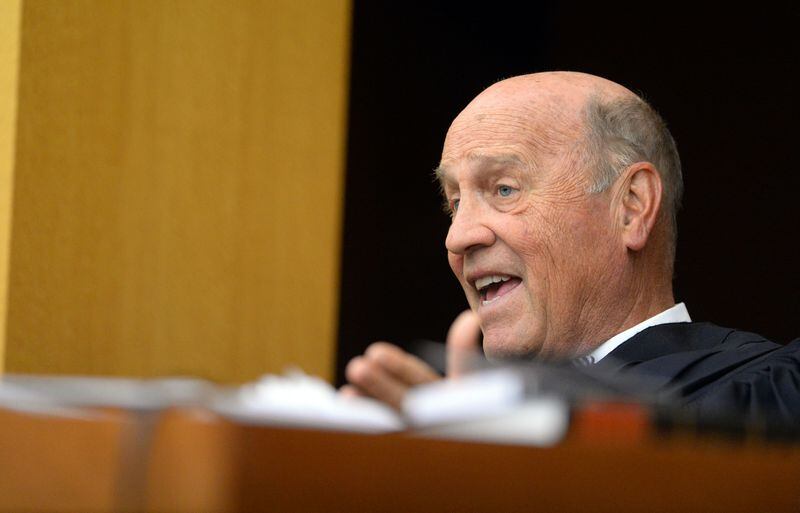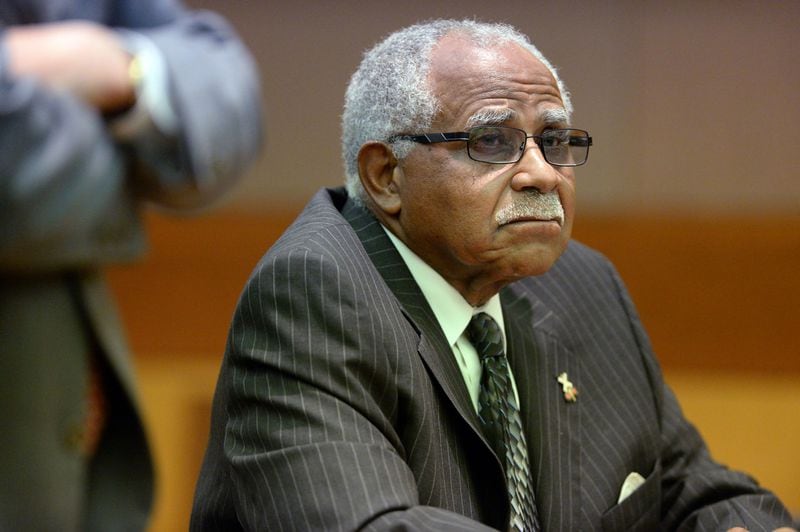After prosecutors sought to have him punished for backing off key testimony in the Atlanta Public Schools test-cheating trial, Armstead Salters had a single plea.
"Pray for me," the former Gideons Elementary School principal said during a brief telephone interview in October.
Salters' day of reckoning came Tuesday, almost five months after 11 former APS educators and administrators were convicted after a months-long trial. He learned he will soon begin spending eight weekends in the Fulton County jail.
Credit: Bill Rankin
Credit: Bill Rankin
"He lied on the witness stand and it made me sick," Superior Court Judge Jerry Baxter said before imposing sentence.
Salters, 76, was one of 21 former educators who pleaded guilty in the APS test-cheating scandal. Initially charged with racketeering, he pleaded guilty to a reduced charge of false statements of writings and a sentence of two years on probation and a requirement to perform 1,000 hours of community service.
Salters, who began his APS career in 1966, was expected to be a key prosecution witness in the Atlanta Public Schools test-cheating trial.
Under his plea deal, he agreed to testify that he orchestrated cheating at Gideons because of "excessive and extreme pressure placed on (him) by the administration."
But when he got to the witness stand on Oct. 7, Salters backed off that entirely. Neither his supervisor Michael Pitts nor Beverly Hall, the late superintendent, "ever encouraged me to cheat," he testified.
Salters' tortured testimony became increasingly painful as prosecutor Clint Rucker reminded him that he'd either initialed or signed every page of his plea agreement that went into great detail about the pressure from above. They'd also discussed every aspect of the agreement, Rucker reminded his unexpectedly hostile witness.
Rucker also recalled that he read aloud every page of the agreement in court when Salters pleaded guilty in December 2013 -- and Salters did not disagree with any facet of it at that time.
Credit: Bill Rankin
Credit: Bill Rankin
But Salters refused to own up to what the agreement said he'd said.
"I may have to go to prison for it, but they never placed pressure on me to cheat under any circumstance," he testified.
Atlanta criminal defense attorney Bruce Morris said it's not unusual for criminal defendants to back off plea agreements and openly admit to wrongdoing when put on the witness stand.
"When you're sitting in that chair and when you've taken the oath, it becomes a lot more serious," Morris said. "Some people find it impossible to admit publicly to wrongdoing. It's not unusual for a defendant to back up on what they'd said in an interview with a prosecutor once they're on the stand, testifying before the world."
Just days after Salters stepped down from the witness stand in October, Fulton prosecutors filed a court motion to revoke Salters' probation. They cited nine instances during his testimony in which he allegedly violated terms of his probation.
It was then, reached at home shortly after the motion was filed, when Salters asked for prayers. "I had to do what I thought was right," he said.
Oddly, even though Fulton prosecutors initially sought to revoke Salters' probation, on Tuesday Rucker told Baxter that Salters did not need to be punished beyond his sentence on probation.
But Baxter wasn't buying it. He then told Salters to spend eight weekends in jail.
"I think Judge Baxter truly believed he needed a more severe sentence (than probation) and tried to make it measured based on (Salters') age," said Morris, the criminal defense attorney.
As for the Fulton prosecution's suggestion for no punishment at all, Morris said, "I find that to be puzzling, in that the state didn't get the benefit of its bargain."
Salters, who could not be reached for comment, apologized to Baxter on Tuesday for what had transpired at trial.
District Attorney Paul Howard said his office's recommendation for no further punishment was based on several factors, such as Salters' age and his willingness to make amends and offer a public apology.
"Salters’ apology was important because it reaffirmed his original admission that not only was there systemic cheating in Atlanta Public Schools, but that much of it occurred as a result of directives from top-level administrators who promoted a culture of cheating," Howard said in a statement issued Thursday.
Given his renewed commitment to be truthful and accept responsibility, "we believed our recommendation to be merciful and appropriate," Howard said. "Nevertheless, we respect the court's sentence and are focused upon moving forward and putting this painful chapter in our community's history behind us."
About the Author








